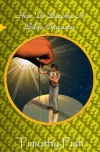
And Thy House
Extra Feature: High Res Image

History of
Cane Creek
Association
by D. F. Magruder
Why Traditionally Publish?
Written By: Timothy Fish Published: 12/2/2007
In a November 30, 2007 posting to his blog, Chip MacGregor, literary agent extraordinaire, made some comments concerning some of the less traditional methods of publication. He has some very valid points about self-publishing. He mentions that the author takes the risk in producing the book, but with greater risk comes the potential for greater reward. He mentions that it can be costly for the author. He mentions bad covers, poor editing and the lack of contacts for marketing the book. All of these are quite valid points, but some of his facts are incorrect.
He states that an author may go into debt $12,000. Some do, but a self-published book can be published for much less. For many, the cost is between $100 and $1500, though there are usually add-on services that may push this price even higher. He compares self-publishing to playing the ponies. This is inaccurate for a couple of reasons. One, if the authorís goal is to make a profit then he can minimize his upfront costs so that he does not have to sell as many books to reach his goal. Two, the goal of the self-published author may not be the same as a traditional publisher. A senior manager, for example, might want to print 100 copies of a book that he has written to rally his workers around his vision. A grandmother may want to print a few copies of a book for her grandchildren. An author may want to record the history of a small organization that is dear to his heart. No self-respecting traditional publisher will publish any of these, but that does not mean that they are not worth putting into print, as Chip implied in a December 1, 2007 comment to his post.
My Exposure to Self-publishing
My exposure to self-publishing came at an early age. Dad was the clerk for two associations. One was a local association with over twenty churches in it. The other was a statewide association of churches. Every year, Mom and Dad would go through the process of getting the minute books printed. The minute books contained a brief history of the association, meeting locations for the next year, the minutes of the associational meetings, names and addresses of the churches and pastors, along with reports. These books also contain the official record of the constitution and bylaws of the association. This is a different type of book than Chip is interested in, but it is a self-published book nonetheless and my early exposure to these self-published books helped me form a favorable opinion toward an author being able to make his work available by his own choice rather than being dependent on the will of others.
Comparing Traditional and Self Publishing
That being said, I believe that there are some very good reasons why working with a traditional publisher may be better than taking the self-publishing route. Unfortunately, Chip, who I believe knows what these are better than I do, has failed to make these clear. The table below shows what I believe the main differences between self-publishing and traditional publishing really are:
|
|
Traditional
Publishing |
Self
Publishing |
|
Advantages |
∑
marketing ∑
Store sales ∑
Royalty advance ∑
editor ∑ book and cover design ∑
branding |
∑
time to print ∑
100% acceptance ∑
Unfiltered
authorís voice ∑
Profit per book
sold ∑
Its fun! |
|
Disadvantages |
∑
Divided
attention ∑
Must please
publisher ∑
Deadlines ∑
2 years to
print ∑
Less than 2%
accepted ∑
branding |
∑
lower quality ∑
risk ∑
author does
everything ∑
lower book
sales ∑
stigma |
Advantages of Traditional Publishing
Letís face it, authors with a publishing contract from a Traditional Publisher love traditional publishing and with good reason. The publisher is responsible for selling the book. The author doesnít just sit around and do nothing, but the publisher has all of the contacts needed to push the book. As if that isnít enough, the publisher pays a royalty advance, and get this, most books never earn back the royalty advance! That is like free money for the author. The publisher also provides an editor, typesets the book, and designs the cover. The last thing on the list of advantages is branding. Michael Hyatt, CEO of Thomas Nelson, has stated, ďAs far as authors go, Amazon can't currently do all that traditional publishers can do, especially when it comes to building their brand.Ē ( http://www.michaelhyatt.com/fromwhereisit/2007/11/the-book-20.html) He was referring to the possibility of the Kindle opening the self-publishing flood gates.
I think the issue of building a brand is probably the biggest advantage that traditional publishing offers to authors. I have so many OíReilly books on my bookshelves that I should be buying stock in the company, but I would be hard-pressed to tell you the name of the author for any one of them. Tim OíReilly started out self-publishing, but he has built a brand that is helping other authors sell their books in a more traditional way. Harlequin has branding down to a science. They cover their books with terrible covers. They mix good authors with bad. Still they are able to sell books by the truckload.
Advantages of Self-Publishing
The advantages of self-publishing do not seem to measure up to those of traditional publishing. The author is in control, makes more money per book sold, doesnít face rejection and it is fun. The one advantage that really stands out it the issue of the time to print. An eyewitness to a disaster can write a book and have it available for sale before people have forgotten about what happened. Traditional publishing struggles when trying to meet that type of deadline. Bleeding edge topics in technology are a struggle for traditional publishers. Self-publishing or small press publishing will always win out when time is of the essence.
Disadvantages of Self-Publishing
The quality of a self-published book is only as good as the effort put into it by the author. The author does everything, so he has no one to blame except himself when there are mistakes and there will be mistakes. There always are. Even traditional publishers make mistakes, so we naturally expect the number of mistakes in a self-published work to higher. A self-published author will normally sell fewer copies of a book than his traditionally published counterpart will. Then there is the stigma attached to self-publishing.For lack of a better term, I will call them book snobs. There are people who see self-publishers as vain. In years past, a self-published author would dump thousands of dollars into a project, end up with hundreds of books in his garage and would only sell a few of them. That is a very inefficient method of producing books and some of the authors were indeed vain. They were so certain that their book was the greatest thing that they were willing to take a very great risk to prove it. The publishing industry is based more on the salability of a book than it used to be, so the situation is somewhat different. Traditional publishers donít publish books based on the quality of the book or the importance of making the subject matter available to the public as much as they publish them based on how well known the author is and how many books they think they can sell. These days, in with the thousands of self-published books that arenít worth reading you will find some jewels that may outshine their traditionally published brethren in terms of the importance of the subject matter, but traditional publishers cannot afford to take the risk. So while only some self-published authors are vain, the stigma clings to all.
The Disadvantages of Traditional Publishing
To this point, traditional publishing looks pretty good. With all it has to offer, why wouldnít every author want to go the traditional route? One reason is that the author has to cater to his boss, the person paying the bills, the publisher. If you want a traditional publisher to buy your work, you write stuff that matches what he is looking for. It may pay the bills, but it stifles freedom of expression. The publisher may be responsible for marketing, but the publisher is not going to be spending nearly as much time on the authorís book as the author would like. With the exception of the authors that write books that actually make publishers money (about 10%), all authors think their publisher should be doing more to promote their book than what it is doing. Traditional publishing takes time. It may take two years for a book to make it into print. There is also that issue of building a brand again. Branding can work either for or against an author. There are some books that people wonít even look at because they donít like the work of the publisher. If Harry Potter had been published by Harlequin, he wouldnít have been nearly as successful.
Then there is the biggest disadvantage of traditional publishing of all. This is the one that makes many authors question why they should even bother. Traditional publishing is not an option for 98% to 99% of the manuscripts that are produced. The odds of surviving Russian roulette with a six shooter and one empty chamber are greater than the odds of any given author making it into the ranks of the traditionally published author. Once he is there, his books had better sell well or he wonít stay there long. Do the math. On odds alone, self-publishing has a greater return on investment than traditional publishing. The average author makes $0 from traditional publishing. If we factor in the money spent on submitting manuscripts, the average author loses money by attempting to follow the traditional publishing route.
So Why Do It?
If the average author has no hope of making money through traditional publishing, why would an author want to pursue it? One of the things that I told Chip was that I really donít care why successful authors like traditional publishing. What I really want to know is why Timothy Fish should like traditional publishing. I am beginning to think that it comes down to conceit or self-confidence, depending on how you want to look at it. I believe that my work is better than the vast majority of the authors who have publishing contracts. If I am as good at what I do as what I think I am, then that puts me somewhere in that 2% rather than the 98% of authors who are not skilled enough to get a contract. As I said before, royalty advances may have free money and book sales are higher for traditionally published authors. The real question is, am I conceited enough to spend the time required to get an agent and a publisher?
www.timothyfish.com



